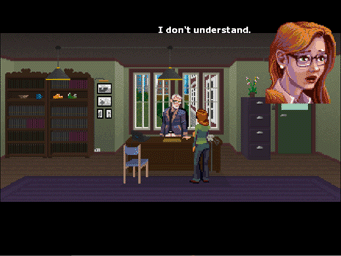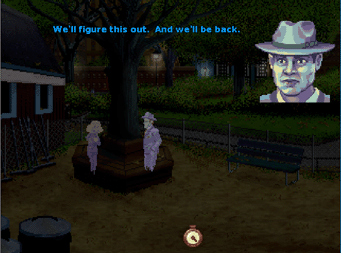One of the biggest complaints we receive about GameCola is that it isn’t interactive enough. (This complaint usually comes after “the layout sucks,” “the writing isn’t very professional,” “nobody—not even the writers—gets the rating system” and “whatever happened to Loafy Carl, anyway?”) So, for the benefit of those of you who are tired of just reading the latest issue of your GameCola, I am pleased to present our very first interactive review, starting…NOW!
Interaction #1: The Blackwell Legacy hits on two of the biggest trends in point-and-click adventure games today. I discuss both of these trends throughout the course of this review without actually describing them as such—see if you can figure out what they are! (Those who have been keeping upwiththereadings shouldn’t have much trouble with this.) Post your answers in the comments section of this review, and I’ll let you know if you’re right.
The Blackwell Legacy opens with its main character scattering the ashes of her dead aunt into a flowing river.
And with that pleasantry out of the way, on to the rest of the review! The Blackwell Legacy is the latest point-and-click adventure PC game from Wadjet Eye Games, the good folks who—you, my loyal GameCola reader, no doubt remember this from a few issues ago—brought us The Shivah, a game about a rabbi accused of murder. This game features the similar theme of helping ghosts move on to the next plane of existence.
You play as Rosangela Blackwell, a young writer who—after a lot of not-very-exciting build-up—learns that 1) she’s actually a spirit medium, and 2) her new lot in life is to help other ghosts come to terms with their ghostly-ness and move on to the next world. Here, the developers craft an exceptionally well-written story—the kind you wouldn’t expect from such a typically lifeless medium, even in this genre—that engages the player and keeps him playing through the not-very-difficult puzzles.
This game is a point-and-click adventure title (one of these days I’ll review something that isn’t), and if, by now, you don’t know what that means, I hate you, because you’re making me type the same goddamn thing every goddamn month. I feel like those authors of serial novels who, at the beginning of each novel, have to spend several pages re-introducitng the characters and recapping the story for any new readers who picked up Animorphs on book 27 or so.
Interaction #2: Figure out what a point-and-click adventure is on your own, jackass! Instead of reading the following paragraph, skip it, and instead research what it means for a game to be a point-and-click adventure. If you think you already know what one is, post your thoughts in the comments section of this review.
Basically, it’s a story-driven, third-person-perspective puzzle-centric game in which you control absolutely everything by pointing on the screen with your cursor and clicking on things with your mouse. You click on where you wanna move, you click on who you want to talk to, you click on what you’d like to pick up and/or manipulate, and so on.
Back in the day with these sorts of games, you had to select “pick up” or “use” or things like that before you could actually perform any of those actions; however, this is not the case with The Blackwell Legacy. Left click to pick up/manipulate an object, and right click to examine—took me a while to figure that out, actually, since it’s so different than what’s been done before. It’s not especially intuitive, but it works, and it means you don’t have to navigate, like, any menus at all in order to do things.
Much how the bulk of The Shivah‘s gameplay was in manipulating “clues”—asking people about them, combining them, pondering them, etc.—the bulk of The Blackwell Legacy‘s gameplay is spent manipulating “notes.” There are items, sure, but they don’t get used very often—and when you do use them, they’re used automatically whenever you click on that which you can use them with, taking away from the game’s difficulty.
Speaking of stuff that takes away from the game’s difficulty, the only things on the screen (and not in your inventory) that you can ever click on are things that you need to click on in order to advance the plot. It’s easy to tell what you need to do when there’s only, like, two things you even can do; so it seems to me that this game might have benefited from just having more background items that serve no purpose other than to provide more things you can click on and examine. Plus, who doesn’t like having a million things to click on, anyway?
The things we click on—indeed, the game as a whole—is, thankfully, gloriously in 2D. Which, if you’re new, I tend to like over any sort of 3D visuals. They’re a step up from The Shivah, whose graphics were already great. Voices, aside from the main character’s (which absolutely needs to be replaced before any sequel can come out), are great. The game’s music is great. These paragraphs are always so boring. It’s impossible to write anything interesting about graphics or sound, which leads to our:
Interaction #3: Try for yourself! In the comments section of this review, write your own paragraph about how wonderful the graphics and/or sound of your favorite game are, and do it without putting the reader to sleep.)
Hmm…I feel like I’m forgetting something….
Interaction #4: Tell me what I’m forgetting to discuss! I know there’s something, but I just can’t figure it out. Post your thoughts in the comments section of this review!
That’s better!
Buy this game. You can do so quite handily at Wadjet Eye’s Web site. I know I haven’t spent a lot of time here saying loved The Blackwell Legacy a whole lot; but I did. The story is brilliant, the graphics are top-notch, the gameplay is innovative, and the music is soundtrack worthy. This is the first game in a new serialized series, meaning that, yes, it’s only like six hours long, which makes the $15 price tag seem a little steep; but it’s worth it to keep this genre stable. Plus, Wadget Eye continues to add to the genre in the form of DVD-like extras, including voice acting outtakes and a commentary mode that are bound to become videogame staples as soon as somebody takes notice.
Interaction #5: I need a final line to pull everything together and end this review. Try writing one yourself! Post it in the comments section of this review.


